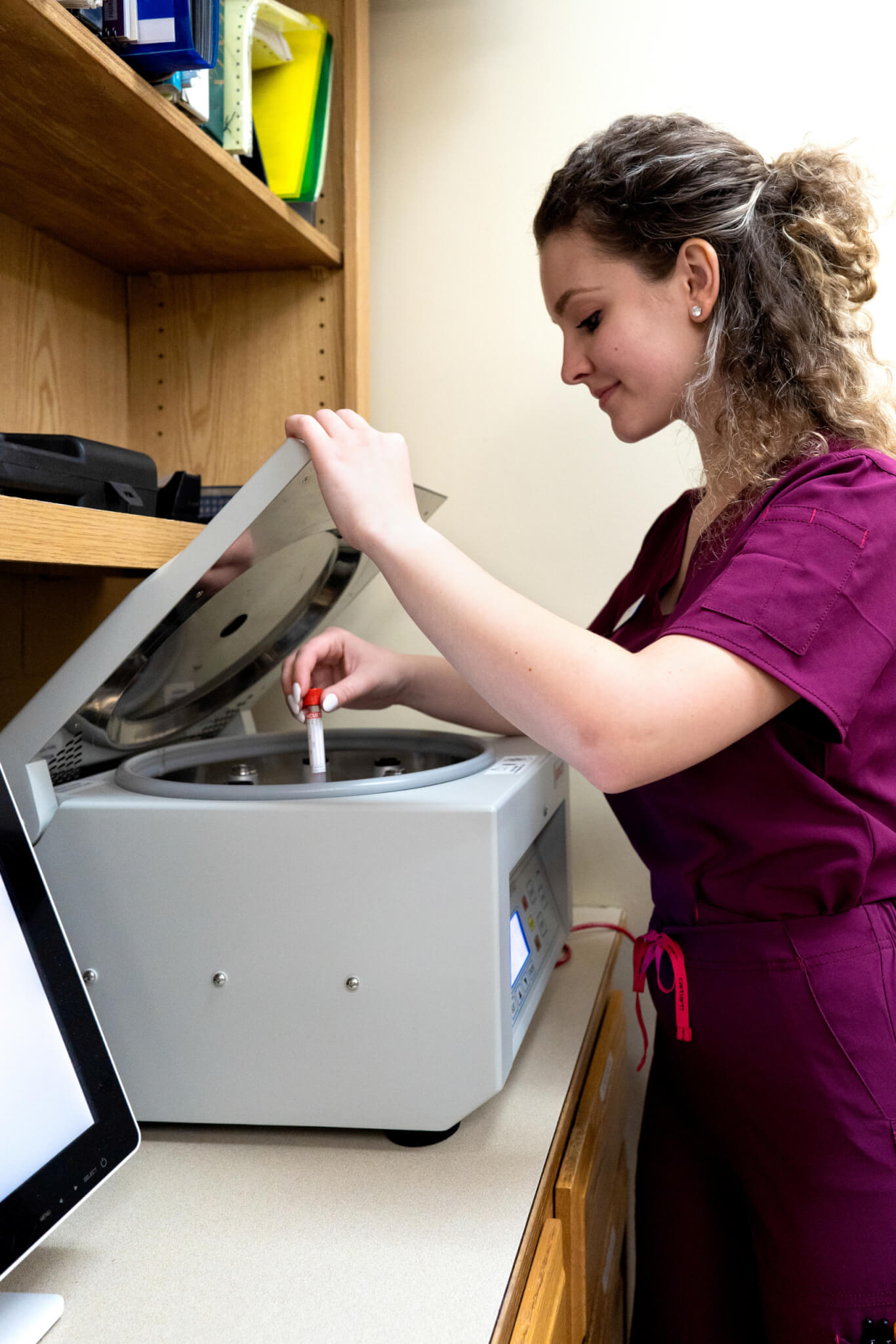When you place your pet in our hands, you trust us to provide the best possible medical care. That is why we may recommend certain tests when your pet is having a medical problem or is scheduled for anesthesia.
Regardless of age, physical examination and medical history of your pet, we recommend diagnostic testing to identify health problems and begin treatment as early as possible. These tests are especially helpful when your pet just isn’t feeling right, and symptoms are hard to define.
If your pet is going to be placed under anesthesia, we strongly recommend pre-anesthetic testing. Anesthesia is extremely safe for healthy pets. But, if your pet is not healthy (and sometimes it is hard to tell without testing), complications can occur both during and after the anesthetic procedure. We can minimize potential risk when we know the health status of your pet before administering anesthesia.
The following are the most commonly tested lab values:
Blood Chemistry
- Albumin (ALB): A protein which is produced by the liver. Reduced levels of this protein can point to chronic liver or kidney disease, intestinal disease, or intestinal parasites such as hookworm infection.
- Alanine Aminotransferase (ALT): An enzyme that becomes elevated with liver disease or injury.
- Alkaline Phosphatase (ALKP): An enzyme produced by the cells lining the gall bladder and its associated ducts. Elevated blood levels can indicate liver disease or Cushing’s Syndrome.
- Amylase (AMYL): An enzyme produced by the pancreas. The pancreas secretes amylase to aid in digestion. Elevated blood levels can indicate pancreatic and/or kidney disease.
- Blood Urea Nitrogen (BUN): BUN is produced by the liver and excreted by the kidneys. Abnormal levels can indicate dehydration, and liver and kidney abnormalities.
- Calcium (CA2+): Increased levels can be seen with disease of the parathyroid gland and kidneys or as an indicator of certain types of tumors.
- Cholesterol (CHOL): Elevated levels of cholesterol are seen in a variety of disorders including genetic disease, liver and kidney disease and hypothyroidism.
- Creatinine (CREA): Creatinine is a by-product of muscle metabolism and is excreted by the kidneys. Elevated levels can indicate kidney disease or urinary tract obstruction.
- Blood Glucose (GLU): High levels can indicate diabetes. In cats, high levels can indicate stress, which can merely be a result of the trip to the veterinary hospital. Low levels can indicate liver disease, infection, or certain tumors.
- Phosphorus (PHOS): Elevated phosphorus can be an indicator of kidney disease.
- Total Bilirubin (TBIL): Bilirubin is a breakdown product of hemoglobin and is a component of bile. Bilirubin is secreted by the liver into the intestinal tract. Blood bilirubin levels are useful in diagnosing anemia and problems in the bile duct.
- Total Protein (TP): The level of TP can detect a variety of conditions including dehydration and disease of the liver, kidney or gastrointestinal tract.
Electrolytes
- Sodium, Potassium and Chloride (Na+. K+, Cl-): The balance of the electrolytes is vital to your pet’s health. Abnormal levels can be life threatening. Electrolyte tests are important in evaluating vomiting, diarrhea, dehydration and cardiac symptoms.
Hematology
- Hematocrit (HCT): Provides information on the amount of red blood cells (RBCs) present in the blood. A low hematocrit indicates anemia.
- Complete Blood Count (CBC): A more complete panel of tests. A CBC provides detailed information on RBCs, white blood cells (WBCs) and platelets. The total WBC and differential (individual cell counts) can indicate infection, leukemia, stress, inflammation, or an ability to fight infection. Low platelets can indicate a bleeding problem. We might advise that surgery be delayed in anemia, infection or especially a low platelet count is present because these conditions could cause serious surgical complications.
- Morphological Inspection: Looking at the cells through a microscope can provide information on the type of anemia or inflammation, or other abnormalities such as leukemia.
Miscellaneous
- Serum T4: This is a measurement of the level of the thyroid hormone circulating in the blood and is helpful in identifying thyroid disease. Thyroid disease occurs in both dogs and cats and can have a serious impact on health if left untreated.
- Urinalysis: The urine contains by-products from many organs such as the kidneys, liver and pancreas. Abnormal levels of these by-products can indicate disease including diabetes, liver and kidney disease.
- Electrocardiogram: Detects heart rate and electrical rhythm. Certain abnormal rhythms and heart rates can be deleterious to animals undergoing anesthesia.

